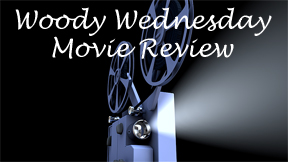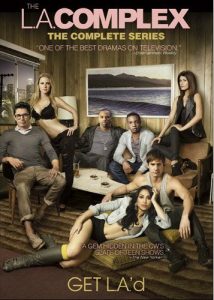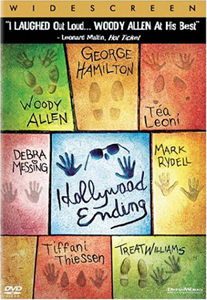A couple years after David Mamet took his (loving) shot at the process of studio filmmaking in “State and Main,” Woody Allen takes a crack at it in “Hollywood Ending” (2002). This isn’t top-shelf Allen, but I did smile and chuckle a fair amount.
The film isn’t as tightly edited as Allen’s best work, and I could tell where it was going from the moment when the central comedic device appears – that director Val Waxman (Allen) has gone hysterically blind amid shooting a picture.
We can see the jokes coming
I figured “Hollywood” would end, after many examples of how awful Val’s film (a remake of “The City that Never Sleeps”) is shaping up to be, with it being an accidental artistic hit. Indeed, that’s what happens, with Val saying “Thank God the French exist!” upon reading glowing overseas reviews.

“Hollywood Ending” (2002)
Director: Woody Allen
Writer: Woody Allen
Stars: Woody Allen, Tea Leoni, Debra Messing
So “Hollywood Ending” is mostly about the journey to that point, and similar to “State and Main” – which I also had quibbles with, although it’s more warm-hearted than this one – it serves up a lot of premises that end up being amusing rather than gut-busting.
Decent pratfall humor
Admittedly, this is where my taste comes in; I’m a sucker for well-done pratfall humor. I got a kick out of the blind Val dropping a liquor glass to shatter on the floor.
But in general, Allen is not exactly Jim Carrey, and several gags go on too long. For example, Val mutters to himself about the locations of furniture in a room as he tries to maintain his secret. It’s not gratingly unfunny, as Allen’s acting skills carry us through, but his better films would tighten this stuff up.
Val is also less funny than the best Allen characters. The once-great director who has fallen on hard times is enough of a cartoon to be laughed at more so than hated, but the focus on him prevents “Hollywood Ending” from achieving further depth.
Also preventing us from taking this film on any serious level is that it’s totally unbelievable that Val and Ellie (the much younger and more vibrant Tea Leoni) were ever a romantic couple.
Commenting on own career?
If one wants to be generous, we could say Allen is commenting on his own career and life. References to “The City that Never Sleeps” being chaotic and unfocused fit with his lesser work. This film, though, isn’t unfocused (it’s too focused on its theme), and its chaos is purposeful.
Mostly, though, Allen is observing the absurdities of the film industry, not himself. And, in this, “Hollywood’s” success level is slightly above middling.
Some non sequiturs are too of-the-time and insider-y, like a one-liner about “Haley Joel Osment’s lifetime achievement award.” But I like some of the broader gags.

An attractive actress (Tiffani Thiessen) tries to seduce Val to kick-start her career. Flighty Lori (Debra Messing, game for this material) is more concerned about her bit part than about her relationship with Val. American preview audiences say the genre of Val’s film is “Early American Garbage,” but then the French adore it.
Unusually loose editing
The payoffs don’t always connect. To site an example of the loose editing, a reconciliation scene between Val and his punk-rocker son, Tony (Mark Webber), finds Tony saying he’d like to be known as “Scumbag X.”
That’s where most Allen films would end the scene – with the laugh giving you a good feeling as you move forward – but here it lingers for a few more seconds. The film doesn’t develop the momentum it could have.
It also passes on humor opportunities. We don’t see much of “The City that Never Sleeps” or even the shooting process. Chinese dialog between the cinematographer and Val’s translator likely contrasts with producer Ellie’s official position that everything is going great, but we aren’t treated to subtitles.
“Hollywood Ending” drives home its point about studio filmmaking simply by positing that a suddenly blind director could continue to direct the film with few people catching on. But – unlike Mamet’s “State and Main” — I don’t get a sense that Allen loves cinema despite itself.
Instead, his dislike of studio-guided filmmaking comes through; this is probably intentional, but it too often comes off as cynical instead of biting.
As for me, I didn’t love “Hollywood Ending,” which is too loose and too long, but the process of watching it didn’t make me want to go blind.

